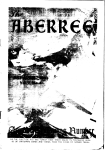Volume 5, Issue 4, page 5
A 100K INTO the FUTURE `: FO ECAST
By "THE RADIANT ONE" Thru JACOB ISAAC APSEL June 21 to Sept. 20, 1958
UNITED STATES inured to international
emergencies and can take all things in
stride, even in those not too common instances where our own allies behave as
badly as our openly avowed foes.
The U.S. A. is the natural habitat of
the strident opportunistic politicians,
so the average citizen seldom gets flustered when backbiting and brawling is
front-page fare for days on end.
The populace cannot take a depression
scare. During a recession period, even the
most trivial published statistic is apt
to become a subject of household concern.
No appreciable check of the slump leading
to an upswing is due until late 1958 or
1959. Conditions are hardly uplifting
despite the furious advertising campaign
on T-V, radio, and newsprint that 'U auto
buy now " . Big business wants people to
prime their own engines instead of doing
it with government spending.
Dirt by the bushel continues to be
turned up by investigating committees,
but the air is soon to clear a little so
that the citizen can discern the saints
from the sinners in high places, especially in the labor-management arena.
A zone in Central U.S., running up and
down from Duluth thru Jefferson City and
Little Rock, is under very good influences. There will be a lessening of social
tensions and a heightening of local economic projects in these cities, with a
responding sigh of relief.
Eisenhower, Dulles, et al are working
skillfully to avoid Summit meetings with
the U.S.S.R.
Vice President Nixon's South American
good-will tour will bring a measure of
desired results, depending on which side
does the evaluating.
(NEAT BRITAIN An overall view is that
adjustments will dominate
the British scene. These will occur in
matters affecting most of transportation,
which will be very upsetting. Altho the
strained feelings in this and most other
industries will be reduced temporarily.
this is not testimony that the growing
attacks from abroad on British markets
will lessen.
Some long-term benefits will emerge
from discussions in May. Still, the position of Britain in regards to foreign
affairs will remain shaky. Britain will
effect a change from certain more or less
traditional policies towards notable unfriendly countries. This will hint at
more to come and the whole situation will
show a fairly rapid onset of crises.
There will be no support for pious expectations of agreements which will include Britain. And there is a doubt
whether even the U.S.A. is going to be
pleased as the story unfolds. That the
U. S. S. R. will be angered seems quite
clear, but she will have initiated trends
in the Middle-east which warrant some indignation in London. In particular, Cyprus
shows her influence as secret agreements
come to light.
Not only foreign affairs but those
concerning trade unions cause anxiety
thruout the country. The government will
make a speedy attempt to introduce legislation to moderate these tendencies, but
it would be a bold person who could feel
happy about major problems of transport
shipping and general trade.
Britain is aware of risks of labor
difficulties. She is suspicious of socalled friendliness abroad, and is more
sensitive than in the last 10 years to
the realities of her condition.
The overplaying of their hands by the
U.S.S.R. and the U.S.A. will have an opposite effect to that intended. A tightening of the main groupings in the nation
will be undertaken by way of mutual selforotection.
RUSSIA Thru the increasingly respected voices of Russia's intellectuals will gradually come a complete overhaul of government policies and aims.
Kremlin die-hards may be systematically
resisting oppressing thought among the
Union's intelligentsia, but the trend is
clearly defined by now and unquenchable.
In the long run, administrative control
of Russian affairs will be affected by
the influence of people to whom world
progress is a second nature, and to whom
isms and political action is childish and
even idiotic, now that there are comets
to ride and worlds to visit.
Economically, Russia is still not satisfied with her progress. Her obligations
jEATHERWISE, the world has taken
on more agitated conditions.
Violent thunder and electrical
storms will prevail thruout our
realm. Fires in homes, schools,
institutions, forests, and factories will
be on the increase. Financial depression
will embolden arsonists, who will make
desperate attempts to save themselves at
the expense of the insurance companies.
Oil, gas, ammunition explosions, as
well as chemical laboratories, will take
a great toll.
Accidents on land, sea, and air -- in
planes, trains, cars, buses, and ships --
will be on the increase. We may expect
more than the usual earthquakes, tornadoes, and violent and damaging floods.
Americans a r e almost
The ABERREE 5


